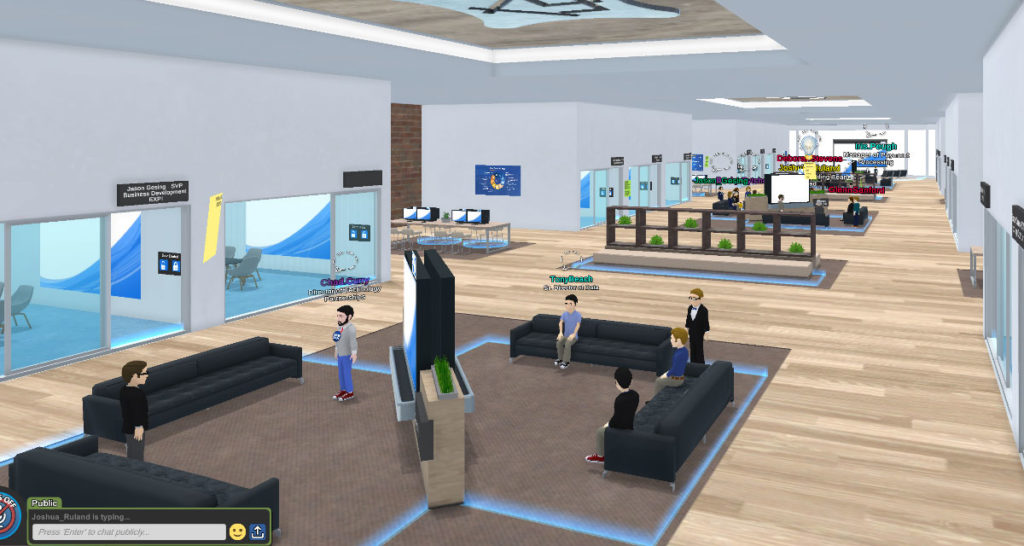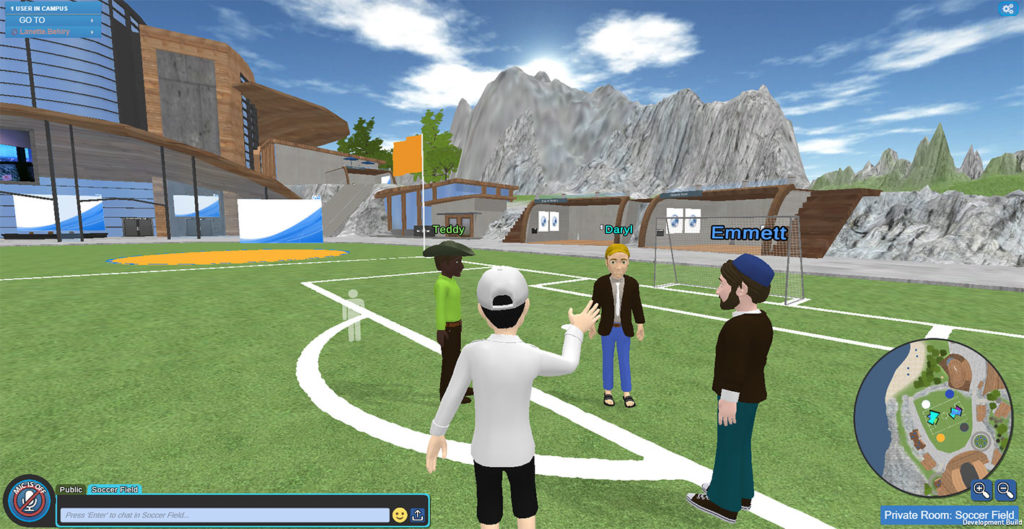During my writing career, I’ve interviewed hundreds of people. While my memory isn’t the best, I can definitively say that this is the first time that I’ve run over an interview subject with a powerboat.
Not to victim-blame, but she knew I had only just learned how to drive the thing a few minutes earlier, and yet she was just standing there in shoulder-deep water right behind my boat.
Luckily none of this happened in the real world, and my interviewee, Melissa Daimler, easily laughed it off. An organizational culture expert who has worked for Adobe, Twitter and WeWork, Daimler has seen everything in the workplace—collaborative cultures working toward common goals as well as toxic cultures that make people miserable.
But she’s never seen anything like the virtual office campus where we met, a creation of VirBELA, the remote collaboration software company angling to revolutionize the future of work.
The World Is Changing
In the simplest terms, VirBELA has essentially transformed the workplace into the world of a video game. Think of its virtual campus as a combination of a conference call and the game Second Life.
For the non-nerds amongst us, Second Life is an online game in which you create a digital avatar and live another life alongside thousands and thousands of others—real people living vicariously through their own avatars. VirBELA’s software is built using the Unity game engine, which was created for virtual and augmented reality games and experiences.
With the COVID-19 pandemic forcing most office workers to telecommute for months, VirBELA has grown exponentially in 2020 as businesses seek out ways to improve the draining experience of working remotely via endless Zoom video chats and conference calls.
One of the greatest challenges businesses and their leaders have faced during this strange year has been to maintain positive, connected company cultures. Think about all of the time you’ve spent through the years casually talking with coworkers you ran into in the hallway. Those “water cooler” moments are much more important for company morale than it may seem.
VirBELA’s open campus and those it creates for its client companies allow employee-users to create their own digital likenesses which can move around and interact with one another while conversing through a shared voice connection. Along with fun perks like the powerboat, the virtual headquarters come with furniture, doors that can be left open or closed, and conference rooms where users can hold meetings. Although you could teleport around these virtual environs, VirBELA Chief Strategy Officer Glenn Sanford says walking across campus is encouraged so workers can have the same psychological feel of being in a real office.

“In a campus setting, I could be hanging out at my desk in my office and people could randomly come up to me and ask me questions,” Sanford says. “It creates lots of opportunities for surreptitious, meaningful collisions to take place on campus. That’s the big, big selling point of VirBELA, because it allows us to have those water cooler conversations that are hard to have using other meeting technologies.”
In addition to his role with VirBELA, Sanford is the founder and CEO of eXp Realty, which acquired VirBELA in 2018 after using it for several years. The fastest growing real estate brokerage firm in North America, eXp boasts a workforce that is fully remote, including its nearly 40,000 agents across the U.S., Canada and Australia. The value of eXp stock (symbol: EXPI) had more than quadrupled year-over-year as of press time.
As the pandemic has driven more companies to remote operation, many have scrambled to find the best platforms for their employees. VirBELA had about 20 full-time employees at the beginning of 2020, but expanded to more than 100 by the end of the summer as the company saw a 260 percent increase in revenue in the second quarter of the year compared to Q1, seeing its new user base jump sixfold.
A growing number of conferences and events, moved online by the pandemic, have been held in a VirBELA universe. The company’s clients include a diverse array of organizations, from huge multinational corporations like the computer manufacturer HTC, to universities such as Stanford and Arizona State looking to the platform for virtual learning, as well as small businesses made up of less than 10 people. Users can choose different packages, from a small office to customizable islands complete with soccer fields and concert venues.

Creating Real Culture, Virtually
Daimler, a consultant for VirBELA, was a relatively new user when we spoke, but she’s on board with the company’s mission because she recognizes it as a way for organizations to maintain their cultures from a distance.
“This crisis has amplified a lot of the practices that we should have been doing anyway in the office,” Daimler says. “I think people are responding either in ways that are strengthening their culture or not.”
Following my tour of the island and sincerest apologies for the powerboat incident, our avatars sat at a table near the center of campus. As she spoke, someone walked directly into our table and stood between us for a few seconds, clearly trying to get a handle on the controls. In real life this would have been incredibly rude and odd. In the virtual world it made Daimler and I laugh out loud.
It’s strange to say, even though I never saw Daimler’s real face, I felt we had formed a bit of a friendship by the end of the interview through these misadventures. Whereas a video conference call often makes people self-conscious, this avatar-based world can have the opposite effect.
That’s a big appeal for businesses that are seeking ways to keep their employees at ease and productive while working remotely. A comfortable, less self-conscious worker is one who is free to use his or her creativity. That’s why Daimler says a platform like VirBELA is so vital in disconnected times, especially for extroverted positions like sales.
“Culture is dead if you think of culture as things that happen in the office,” Dailmer says. “But I define culture as what happens between people.”
While Sanford is quick to point out the millions of dollars a company could save by not renting physical office space, Peter Hirst focuses on the experiential side when explaining the benefits to executives. The Senior Associate Dean of Executive Education at MIT’s Sloan School of Business, Hirst has studied and worked with platforms like VirBELA for years.
“I just say ‘You’ve got to try it.’ It’s such an experience that, as much as I can try to provide you with the benefits or explain it, you won’t get it until you try it,” Hirst says. “Even if you’re not sure about it for yourself or your own work, it’s worth keeping in mind that this is one of the ways that the current and coming generations are actually interacting with each other. Yes it sounds a little bit like computer gaming, but in reality, that is a mode of interaction that an increasing number of people are comfortable with.”
Fun, but Does It Work?
I found my visit to the VirBELA open campus to be extremely fun. From customizing my avatar, to driving the powerboat, to racing strangers on the soccer field and just walking around exploring new places, I was having a great time. But that’s not my workplace, so I was still a little bit unsure how the people who visit it every day feel.
I could see how it would be really convenient to have a large company meeting in one of the auditoriums, with the ability to put all the attendees in a seat, mute their microphones while the speaker talked, and give more of a feeling of togetherness than a huge conference call. And I could really understand the benefits of meeting together without having to make yourself look presentable in the harsh light of the computer screen for a video call.
But I still wondered about the benefits for a business, so I had to see exactly how a real-life company used it. For that, I took a tour of eXp World with a spokesperson for eXp in the company’s communications and marketing department. She showed me how eXp’s agents use the platform to get tech support and for meetings. We even teleported from the Texas offices to the Canadian offices, which is where I finally got a full understanding of the importance of a platform like VirBELA.
As we stood in the Canadian office, with doors that led to the branches dedicated to each province of Canada, a woman named Juliette entered. She greeted my tour guide warmly and they had a nice conversation before Juliette invited us to walk through the Quebec door “if you want to enjoy some French.” After Juliette went to her office, I asked my guide if they were friends in real life or just eXp World.
It turns out they have interacted quite a bit on the virtual campus, but have only met once in person at an event.
When they finally met in person, my guide said, it was like seeing an old friend.
This article originally appeared in the November/December 2020 issue of SUCCESS magazine.
Photo by GaudiLab/Shutterstock.com





